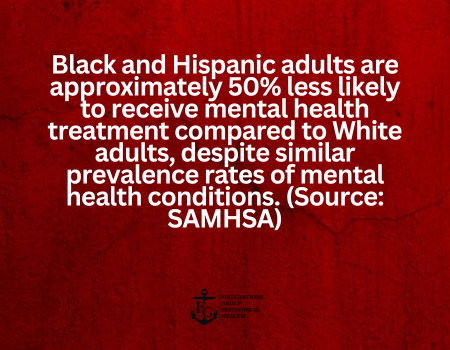Mental health care is not a one-size-fits-all approach. The interplay between mental health and diversity is complex, shaped by cultural, social, and economic factors that influence how individuals experience, perceive, and address mental health challenges. Understanding this dynamic is essential for providing equitable and effective care, breaking down systemic barriers, and ensuring everyone has access to the support they need.
At Foundations Group Behavioral Health, we recognize the critical importance of diversity in mental health care. Through programs like Psychiatric Day Treatment, Half-Day Treatment Programs, and Outpatient Mental Health Programs, we strive to offer inclusive, culturally competent care tailored to meet the unique needs of individuals from diverse backgrounds.
The Relationship Between Mental Health and Diversity
Diversity encompasses a wide range of identities and experiences, including race, ethnicity, gender identity, sexual orientation, socioeconomic status, disability, and more. These factors significantly shape how individuals understand and manage mental health conditions, influencing their access to care, willingness to seek help, and overall outcomes.
Key Factors Influencing Mental Health in Diverse Communities
- Cultural Beliefs and Stigma:
In some cultures, mental health conditions are seen as a personal weakness or taboo, discouraging individuals from seeking treatment. - Economic Inequities:
Socioeconomic disparities, such as poverty, limited insurance coverage, and lack of transportation, make accessing mental health services difficult for many. - Historical and Generational Trauma:
Experiences like systemic racism, colonization, and discrimination have long-term effects on the mental health of marginalized communities. - Representation in Care:
A lack of diverse mental health professionals can lead to misdiagnoses, cultural misunderstandings, and feelings of alienation for patients.
The Disparities in Mental Health Care
Despite progress in addressing mental health issues, significant disparities remain in how care is delivered to diverse populations.
1. Racial and Ethnic Minorities
- Access to Care:
- Black and Hispanic adults are 50% less likely to receive mental health care compared to White adults. (Source: SAMHSA)
- Asian Americans have the lowest rates of mental health service utilization, with only 23% seeking care despite experiencing high levels of stigma. (Source: NAMI)
- Cultural Barriers:
- Language differences and mistrust of healthcare systems contribute to lower engagement in mental health services.
2. LGBTQ+ Communities
- Mental Health Challenges:
- LGBTQ+ individuals are 2.5 times more likely to experience depression, anxiety, and substance use disorders. (Source: The Trevor Project)
- Transgender individuals report disproportionately high rates of suicidal ideation, with nearly 40% considering suicide at some point in their lives.
- Barriers to Care:
- Fear of discrimination, lack of inclusive providers, and social stigma often prevent LGBTQ+ individuals from seeking help.
3. Socioeconomic Disparities
- Impact of Poverty:
- People living below the poverty line are three times more likely to report severe psychological distress. (Source: CDC)
- Access Issues:
- Financial barriers, lack of insurance, and limited availability of services in low-income areas exacerbate mental health challenges.
The Importance of Diversity in Mental Health Care
1. Improving Outcomes Through Cultural Competency
Cultural competency involves understanding and respecting the values, beliefs, and lived experiences of individuals from diverse backgrounds. Mental health providers who adopt culturally informed practices are better equipped to build trust, accurately diagnose conditions, and create effective treatment plans.
2. Addressing Systemic Inequities
Systemic barriers, such as discriminatory policies, unequal resource distribution, and lack of representation in healthcare leadership, must be addressed to create equitable access to mental health care.
3. Reducing Stigma
Educating communities about mental health and normalizing help-seeking behaviors can reduce stigma, particularly in cultures where mental health conditions are misunderstood or taboo.
4. Promoting Inclusion and Representation
Increasing diversity among mental health providers and incorporating community voices into care delivery can foster a greater sense of belonging and trust for patients.
Strategies for Inclusive Mental Health Care
1. Culturally Competent Training for Providers
Mental health professionals must receive ongoing education to understand the unique challenges and needs of diverse populations.
- What It Looks Like:
- Incorporating cultural awareness into therapy techniques.
- Addressing implicit biases and stereotypes.
- Offering therapy in multiple languages.
2. Expanding Access to Care
Accessibility is a critical component of mental health equity. By addressing logistical and financial barriers, providers can ensure more individuals receive the care they need.
- What It Looks Like:
- Offering telehealth services for those in remote or underserved areas.
- Implementing sliding-scale fees to make care affordable.
- Partnering with community organizations to provide outreach and resources.
3. Representation in Mental Health Fields
Representation matters in building trust and understanding between providers and clients.
- What It Looks Like:
- Recruiting and supporting individuals from underrepresented backgrounds to join the mental health workforce.
- Highlighting diverse perspectives in mental health research and policy-making.
4. Building Community Trust
Engaging with communities directly and fostering trust can bridge the gap between marginalized populations and mental health services.
- What It Looks Like:
- Hosting mental health education workshops in diverse communities.
- Collaborating with cultural leaders and organizations to reduce stigma.
- Creating safe spaces for open dialogue about mental health.

How Foundations Group Behavioral Health Supports Diverse Mental Health Needs
At Foundations Group Behavioral Health, we are committed to providing inclusive, culturally informed care for individuals from all backgrounds.
1. Psychiatric Day Treatment
- Focus: Intensive care for individuals with significant mental health challenges.
- How We Address Diversity: Individualized treatment plans that respect cultural values and lived experiences.
2. Half-Day Treatment Programs
- Focus: Flexible care for individuals balancing treatment with personal or professional responsibilities.
- How We Address Diversity: Group therapy sessions that incorporate diverse perspectives and experiences.
3. Outpatient Mental Health Programs
- Focus: Therapy and support for individuals managing mild to moderate symptoms.
- How We Address Diversity: Offering therapy in multiple languages and connecting clients with culturally competent providers.
4. Co-Occurring Disorder Treatment Programs
- Focus: Comprehensive care for individuals with both mental health and substance use challenges.
- How We Address Diversity: Tailored approaches that consider the cultural and social factors influencing recovery.
The Path Forward: Advocating for Mental Health Equity
Addressing the intersection of mental health and diversity requires a collective effort from providers, policymakers, and communities. By fostering cultural competence, expanding access to care, and promoting inclusivity, we can create a mental health system that meets the needs of all individuals.
At Foundations Group Behavioral Health, we are proud to be part of this mission. Our programs are designed to provide compassionate, equitable care that celebrates diversity and empowers individuals to thrive.
Conclusion
If you or a loved one is seeking mental health support, know that help is available. At Foundations Group Behavioral Health, we are committed to creating a safe, inclusive environment where individuals from all backgrounds can find the care they need.
Call us today at 888.685.9730 to learn more about our programs, including Psychiatric Day Treatment, Half-Day Treatment Programs, and Outpatient Mental Health Programs. Together, we can build a path to wellness that respects and celebrates diversity.
FAQ on Mental Health and Diversity
Why is diversity important in mental health care?
Diversity ensures that mental health care is inclusive and tailored to the unique cultural, social, and economic needs of individuals from various backgrounds, improving outcomes and accessibility.
How does culture impact mental health?
Culture influences how people perceive mental health, experience symptoms, and seek treatment. Culturally competent care addresses these differences to provide effective support.
What are common barriers to mental health care for diverse populations?
Barriers include cultural stigma, language differences, lack of access to affordable care, and limited representation of diverse providers in the mental health field.
What is cultural competency in mental health care?
Cultural competency refers to the ability of providers to understand, respect, and address the cultural and social factors that influence a patient’s mental health and treatment preferences.
How do socioeconomic factors affect mental health?
Economic disparities, such as poverty or lack of insurance, can increase stress and limit access to mental health services, disproportionately affecting underserved communities.
What role does representation play in mental health care?
Representation fosters trust and relatability between clients and providers. Diverse professionals in mental health care ensure more inclusive and effective support for all populations.
How does Foundations Group Behavioral Health support diverse populations?
We provide inclusive care through programs like Psychiatric Day Treatment, Half-Day Treatment Programs, and Outpatient Mental Health Programs, with culturally competent providers and tailored approaches to meet diverse needs.








